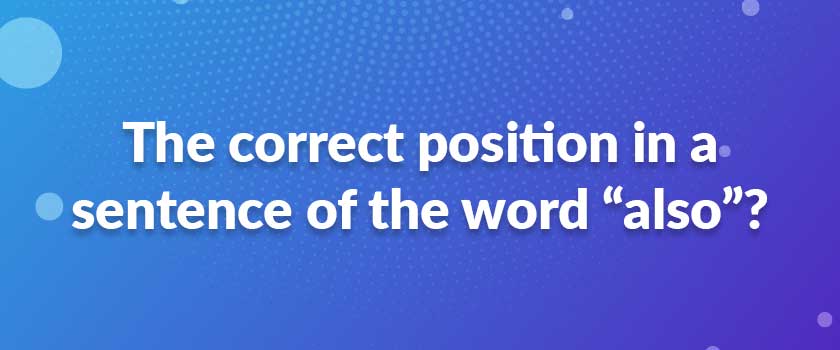What is the correct position in a sentence of the word “also”?
One of the most common mistakes associated with word order is the tendency to put adverbs in the wrong place. This particularly applies to the word “also”, but other adverbs are commonly misplaced too.
There are some examples with “also” as follows:
我们也包含了从1月1日开始的假日信息
WRONG
We included also the information that the holiday year starts on 1 January.
RIGHT
We also included the information that the holiday year starts on 1 January.
以上规则也适用于保密信息
WRONG
The rules set out above apply also to the Confidential Information.
RIGHT
The rules set out above also apply to the Confidential Information.
As these examples show, “also” should go between the subject and the verb, NOT after the verb. The next examples – with other adverbs – follow the same pattern:
我们只能在最后期限前完成项目的第一部分。
WRONG
We have only time to finish the first part of the project by the deadline.
RIGHT
We only have time to finish the first part of the project by the deadline.
谁经常能看到保密信息?
WRONG
Who has usually access to classified information?
RIGHT
Who usually has access to classified information?
There is, of course, an exception to this rule. When the verb is “to be” the adverb usually goes after the verb:
She is also an experienced adviser on mergers and acquisitions.
她在兼并收购方面也是一位经验丰富的顾问。
The client is often unable to sign documents at short notice due to extensive foreign travel.
由于大量出差,这位客户经常不能一接到通知就签合同。
When a sentence has an auxiliary verb and a main verb, it is usual to put adverbs between them. For example:
We have finally completed the project.
我们终于完成了这个项目。
Here “have” is the auxiliary verb and “completed” is the main verb; “have completed” is the present perfect tense.



